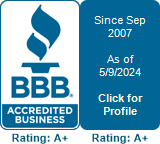Preparing Your Small Business for an Audit
- By Admin
- •
- 30 Jun, 2018
- •

An audit can be a frightening experience, but it doesn't have to be. Though an IRS audit may involve some additional work, the IRS generally wants to work with you as a business owner. As long as any mistakes were truly mistakes, the IRS will likely just fix your issues for you and make some suggestions moving forward. Still, for the best possible outcome, you'll want to prepare in advance.
Take a Look at Your Tax Returns
An audit may go back several years. Your auditor will tell you which years are being audited. Pull out the copies of your tax returns and review them carefully for any mistakes. If you can find issues preemptively, you can explain why those issues occurred.
Many people are afraid of an audit because they believe they are in legal trouble. If you haven't knowingly misreported your income and expenses - if the issues with your tax returns truly are mistakes - the IRS will mostly be concerned about creating accurate records. Sometimes these errors are actually in your favor. If the IRS finds that you paid too much in taxes, they will issue you a refund.
Get Your Supporting Documents Together
For each expense and income item on your tax return, you should have the supporting documents available to defend your numbers. This includes bills, receipts, invoices, and deposit slips. You should be able to point to backup for every line item.
If you can, you may want to create a spreadsheet to document each of these expense items. The more well documented you are, the faster the audit is going to go. You want your auditor to be able to review your return at a glance, verify what they need to verify, and close your case.
If there are items that you can't substantiate, make sure you note why you can't substantiate them. For example, you may estimate that you spent $300 on office supplies in a month. You will need to be able to show your auditor why you made the estimates that you did.
Not everything does have to have a receipt. It is reasonable for a business owner to have some expenses that were jotted down, such as meals and entertainment expenses that were recalled after the fact. The auditor will only take issue with this if it happens excessively.
Collect Bank Statements, Credit Card Statements, and Investments
All of your bank and credit accounts are likely to be relevant, as the auditor is going to want to tie your expenses and income to real deposits and deductions in your account. If you can, you may also want to add account reconciliations and general ledger reports to show how your expense line items tie directly into your bank statements.
Most banks keep bank statements on file for a long time, so you should be able to refer to them if necessary. At this time, you can make sure that all of your checks were properly entered and that all of your expenses were coded correctly. If you find any errors at this stage, take notes for the auditor and describe how you will avoid these errors in the future (such as through additional review).
An audit can be less a stressful experience and more an opportunity to review your own accounting controls and improve upon them. Nevertheless, it is also a very important process, and you want to make sure you have all of the documentation you can to avoid a hefty tax bill.
If you've been notified that you're going to undergo an audit, you'll want the help of a professional. Contact Williams & Associates Tax Services for a consultation.











